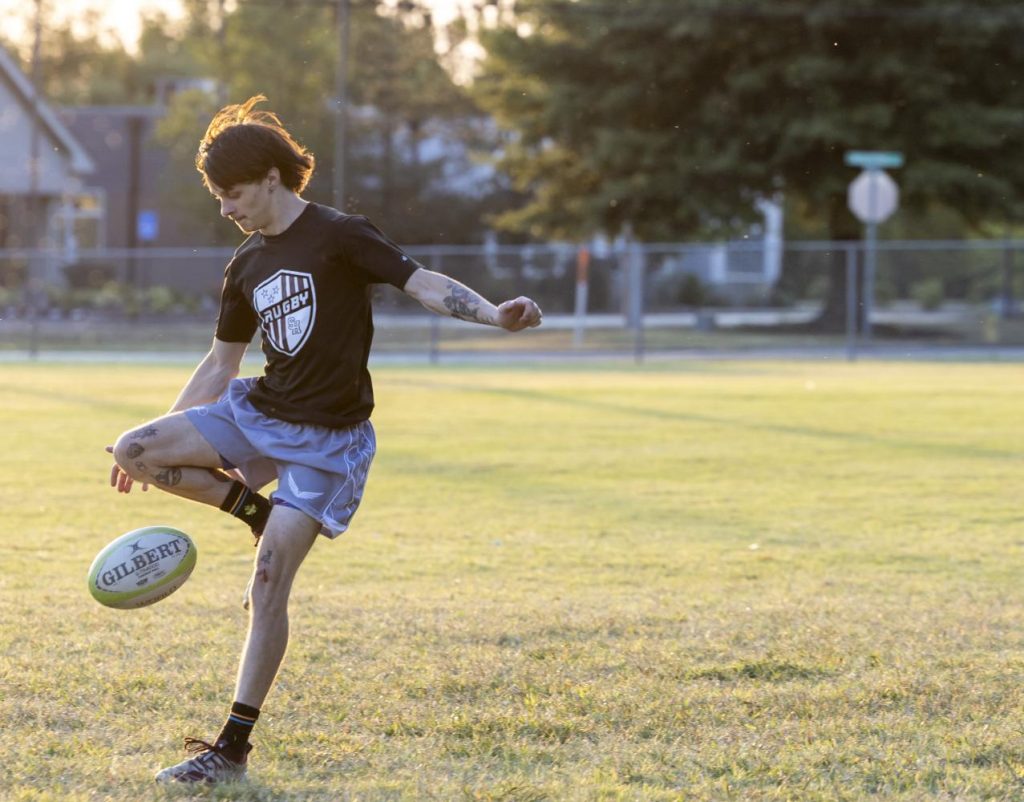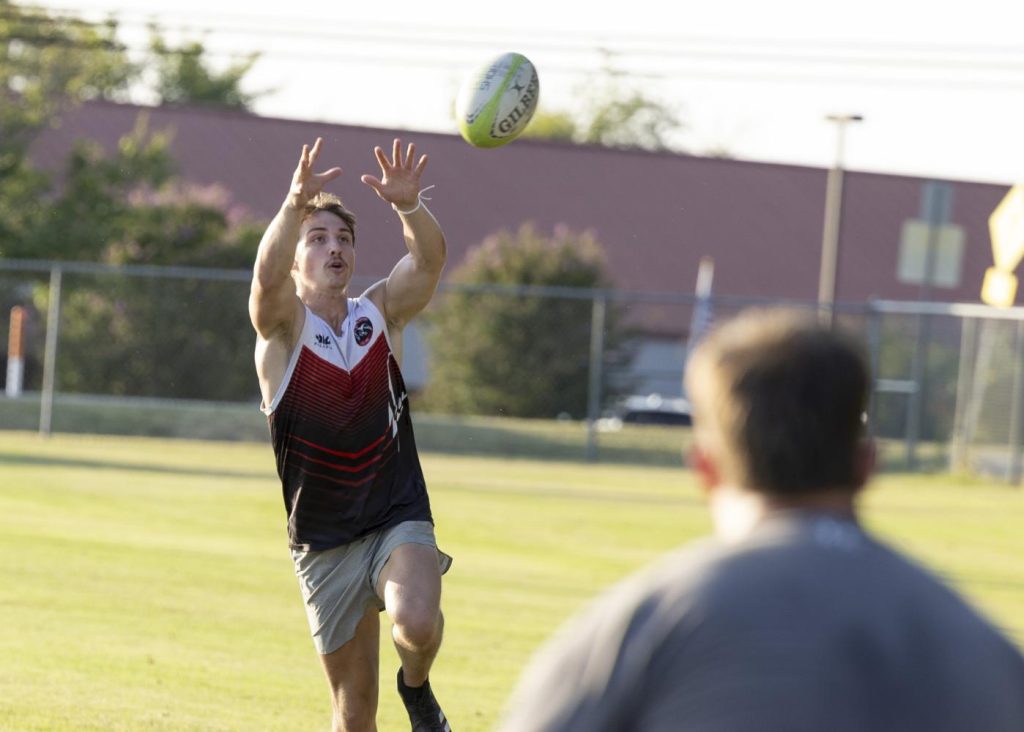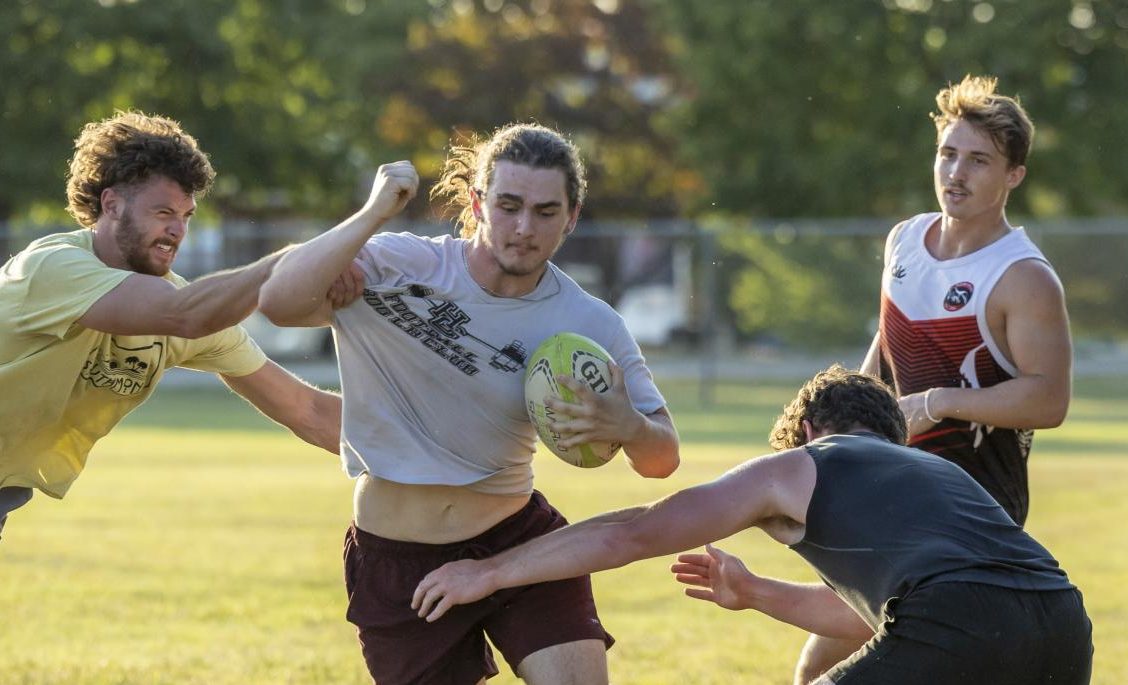Amid the crowds and spotlight of other fall sports on campus, one team stands out not for the recognition they receive, but for their skills on the field. Junior Max Lawrie from Park Hills said the WKU men’s rugby club, also known as the “Dirty Reds,” has a roster of skilled players, passionate coaches and continues to excel despite being overlooked.
Established in 1976 by Billy Whalen, the men’s rugby club provides players with a chance to compete and build connections within their community, whether they are experienced or new, according to their website. Despite their success and significant contribution to intramural clubs, first year member Freshman Jakobi Russel of Bowling Green said they are often under-recognized as a club for their achievements.

As team captain and president of the club, senior Adam Cowgill from Louisville said the lack of recognition does not bother him, but he would appreciate more enthusiasm toward the sport.
“Because it is not as big of a sport in the United States, it comes with the nature of playing the game,” Cowgill said. “It’s growing, so you just have to be patient, even with recruitment.”
Cowgill said he started playing rugby five years ago when his friends encouraged him to give it a try. Previously a lifelong soccer player, Cowgill said he was looking for a change of sports.
Now, having been a member of the team for four years and serving as team captain, Cowgill has a new perspective on what it means to be part of the Dirty Reds. Cowgill said that by stepping into a new leadership role, he found himself adjusting to the challenge of doing what’s best for his team.
“First and foremost you have to do your best to be a role model and get 20-plus guys on the same page and focused,” Cowgill said. “It has helped me grow as a person and I’m forever grateful that I was given the opportunity.”
Senior Hank White from Franklin, Tennessee, who has been playing rugby since seventh grade, said that there are either seven or 15 players on the field, depending on the type of game.
“Players one through eight are forwards, also known as the ‘heavy hitters,’’’ White said. “Players nine through 15 are backs, who handle most of the running and playmaking.”
White said that although rugby is often seen as dangerous due to the lack of pads, that’s not the reality.
Lawrie said that people assume the sport is more dangerous than football, which he played before rugby, when it actually isn’t. Rugby laws created by World Rugby are changed frequently to ensure safety of the members, he said.
“Obviously it’s a physical sport and it makes you tough, but there are rules put in place to keep people from tackling dangerously,” Lawrie said. “You also don’t have the false sense of security that football helmets give you, so you take more effort into protecting yourself.”
White, who said he struggles with pre-game nerves, finds relaxation through music. Many players use music as a way to pump themselves up or calm their pre-game jitters, he said. While some players listen to artists like Bob Marley, others listen to “dad rock,” which carries husky vocals and heavy guitar, according to an article by Bryan Parys of Berklee College of Music.
Having transitioned from a lineman in football to a forward in rugby, Lawrie said he has forged unforgettable new experiences.

“I will never forget my first score in a game,” Lawrie said. “Being an offensive lineman in football growing up, I always watched the running backs and receivers get all of the glory. But when I touched the ball down for the score for the first time, I felt like I was on top of the world.”
Lawrie said despite the lack of focus on recruitment, they managed to get 22 men on their roster this semester. While everyone comes from different backgrounds, he said they join together for the shared love of rugby.
“The team is made up of so many different people with all kinds of unique backgrounds,” Lawrie said. “We even have someone from another country playing with us, which has been a really cool experience.”
In addition to evolving rules and safety measures, there is a sense of camaraderie felt between teams. Cowgill said that while there may be violence on the field, teams often go out to dinner with each other afterward, hanging out and sharing stories.
“There’s guys I’m super close friends with that I play with in the summer, that are rivals during the regular season,” Cowgill said.
The rugby experience does not end after the season or college experience, Cowgill said. The Dirty Reds can experience many opportunities such as connecting with alumni to get perspective on how things have evolved.
“We have a lot of committed alumni and they have some crazy stories from the ‘80s to the 2000s,” Cowgill said. “There’s just so much history and so much you can learn from the alumni,”
Cowgill said he encourages people to come to at least one practice to decide whether it is for them or not. With no forced commitment, he motivates everyone to give it a try.
“I encourage everyone to at least watch rugby,” Cowgill said. “It’s an awesome sport to watch and be a part of and I’ve made my best friends playing that sport which is such a cool experience.”
Cowgill said the Dirty Reds are always open to new members, even if they do not have experience with rugby. The best way to reach out and join is to attend a practice.
Their practices occur at the Hattie L. Preston Intramural Sports Complex every Tuesday and Thursday from five to seven p.m. The Dirty Reds are also active on their Instagram, where they post game schedules and team information.



